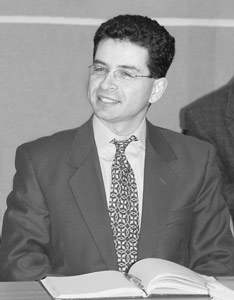|
THE INTERNATIONAL MONETARY FUND HAS SOME QUESTIONS FOR THE GOVERNMENT
| |
 |
| |
Mr Ruggiero is not complaining about lack of information from
government's side: "We are notified in time about everything, that
we already know of..."
|
On the eve of the IMF mission, Edgardo Ruggiero, the resident
representative of the IMF in Moldova held a press conference. Mr.
Ruggiero said that the next tranche of US$ 25 million can hardly be
disbursed before June.
The resident representative of the Fund assessed his projections as
optimistic. He made no further comment on the pessimistic scenario,
saying that it was unlikely. However, further discussion centered round
the accumulated problems, which indicated that the issue of resuming
financing to Moldova had not been decide fully yet. The two-week IMF
mission (March 13 through 26) will be a trial for the Government.
Edgardo Ruggiero said, that the IMF staff will only be able to take
the issue of disbursement to the attention of the Executive Board if
Moldova makes progress in fulfilling its obligations. During the
mission, the IMF staff will look at the preparation of the Economic
Growth and Poverty Reduction Strategy, check the consistency of
macroeconomic indicators for 2002, and discuss projections for 2003 with
the Government. According to the resident representative, increase in
tax revenues is extremely important when privatization proceeds are late
in arriving. In addition, given the fact that economic development
indicators were reasonably good last year, higher inflation rate in
January-February 2003 (3.7%) provokes concern.
The IMF is not in agreement with the Government on fiscal policy: in
terms of deficit the parts of the consolidated budget are not in
balance. All the deficit falls on the state budget, whereas local
governments’ budget and the social insurance budget break even. Here the
fiscal policy should follow the combination principle, recommended
Ruggiero. The IMF staff will have a close look at the expenditure side
of the budget in order to see whether the revenues are sufficient to
cover wage increase and social assistance. The staff will also look
carefully at the social insurance budget. After the IMF Board approves
disbursement of the trance, Moldova will be able to go the Paris Club
with a request to restructure debt, assured the IMF representative.
The IMF staff will also look at the export and import policy.
According to Edgardo Ruggiero, the IMF is not in favor of restriction of
exports of wheat and sun-flower seeds, counter to agreed upon decisions.
In that sense, the institute of exchange trading created under donors’
insistence does not fully match its functions. The commodity exchange
exists but its role in wholesale commodity turnover or as a mechanism
for promoting local goods in the international markets is rather
negligible. Indeterminateness of the authorities in meeting the IMF
requirements can be also traced in the Law on Pre-shipment Inspection (PSI)
of imported goods.
The IMF will insist on accepting its own version in resolving this
problem. According to the opinion shared by the Fund staff, under
conditions of small-scale Moldovan market, involving a number of
companies did not look justified and who, says Ruggiero, will agree to
come after all what has been done and said. Having incorrectly compared
the functions of a private company SGS with the functions of state
structures, the resident representative of the IMF suggested not to use
the term “monopoly” in application to a foreign company: “You wouldn’t
say that the Tax Inspection has monopolized tax collection function in
the state?” – and went on mentioning that “SGS exists to assist to the
customs service and one can only talk about the price of the matter”. As
further mentioned by Edgardo Ruggiero the Government of the Republic of
Moldova shall find a balance between the cost and the objectives pursued
by the PSI program.
The draft law of pre-shipment inspection circulated for comments by
the IMF staff has principal differences as compared to the one
considered by the Government and Fund staff last year in October. The
IMF representatives are unable to understand the reasons why the
Government decided to change its opinion on that issue.
Irina COVALENCO |